Steve+Kang
-
 KAIST Celebrates the 2017 Commencement
KAIST hosted its 2017 Commencement, awarding diplomas to 2,767 members of the Class of 2017 during a ceremony on February 17. President Sung-Mo Kang, Minister Yang-hee Choi of Science, ICT, and Future Planning, and Chairman of the KAIST Board of Trustees Jang-Moo Lee joined the ceremony along with the graduates and their family and friends at the Ryu Keun Chul Sports Complex.
The graduating class included 638 Ph.D. degrees, 1,335 Master’s degrees, and 794 Bachelor’s degrees being conferred. Among them, Young-Ki Song from the Department of Electric Engineering was honored to win the Minister’s Award, the highest award bestowed to an undergraduate. The KAIST Presidential Award went to Min-Jae Park of the Department of Mathematical Sciences and the KAIST Board of Trustee Chairman’s Award was presented to Jae-Hyung Cho from the Department of Mechanical Engineering.
Including this year’s graduating class, KAIST has turned out more than 59,000 highly educated science and technology talents including 11,731 Ph.D.s since its foundation in 1971. This year, 24-year-old Seo-Hee Oh earned her Ph.D. in chemistry as the youngest Ph.D. of the year after completing her Master’s and Ph.D. combined course in three years.
President Sung-Mo Kang praised the creativity of this graduating class and their excellent ability in his charge, saying, “As future leaders of our society, you are expected to develop a sense of compassion and outstanding professionalism to contribute to the advancement of not only Korea but also the whole world.’
For full text of President Kang’s charge to the graduates, please click.
2017.02.17 View 10421
KAIST Celebrates the 2017 Commencement
KAIST hosted its 2017 Commencement, awarding diplomas to 2,767 members of the Class of 2017 during a ceremony on February 17. President Sung-Mo Kang, Minister Yang-hee Choi of Science, ICT, and Future Planning, and Chairman of the KAIST Board of Trustees Jang-Moo Lee joined the ceremony along with the graduates and their family and friends at the Ryu Keun Chul Sports Complex.
The graduating class included 638 Ph.D. degrees, 1,335 Master’s degrees, and 794 Bachelor’s degrees being conferred. Among them, Young-Ki Song from the Department of Electric Engineering was honored to win the Minister’s Award, the highest award bestowed to an undergraduate. The KAIST Presidential Award went to Min-Jae Park of the Department of Mathematical Sciences and the KAIST Board of Trustee Chairman’s Award was presented to Jae-Hyung Cho from the Department of Mechanical Engineering.
Including this year’s graduating class, KAIST has turned out more than 59,000 highly educated science and technology talents including 11,731 Ph.D.s since its foundation in 1971. This year, 24-year-old Seo-Hee Oh earned her Ph.D. in chemistry as the youngest Ph.D. of the year after completing her Master’s and Ph.D. combined course in three years.
President Sung-Mo Kang praised the creativity of this graduating class and their excellent ability in his charge, saying, “As future leaders of our society, you are expected to develop a sense of compassion and outstanding professionalism to contribute to the advancement of not only Korea but also the whole world.’
For full text of President Kang’s charge to the graduates, please click.
2017.02.17 View 10421 -
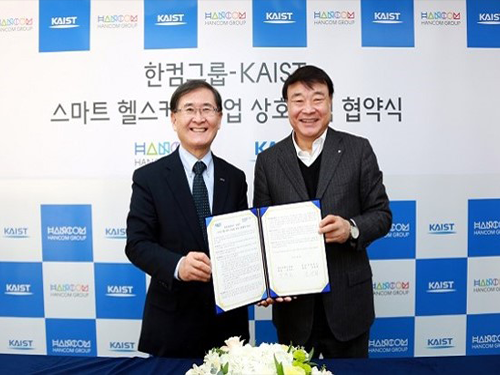 Dr.M Drives Smart Healthcare Industry in Partnership with Hancom
President Sung-Mo Kang signed an agreement on January 25 with Hancom Group Chairman Sang Chul Kim to establish a smart healthcare complex in Gapyeong, Kyonggido. With the Gapyeong complex launch, KAIST will come to commercialize Dr. M system along with other Dr.M consortium members as a new growth engine to drive the smart health industry.
Dr. M is a smart healthcare platform developed by the Health Science Research Institute at KAIST in 2014. Dr. M is capable of analyzing and predicting diseases, as well as prescribing, by incorporating ICT and medical technologies. Dr. M applies diverse technologies such as healthcare sensors, wearable devices, low-power communications technology, and cloud and big data collection platforms.
Hancom Group, a leading computer software company in Korea, has participated in the project since 2015 for advancing the smart healthcare market by developing mobile healthcare software program. Hancom joined the Dr.M consortium launched last November.
(President Kang (left) poses with Hancom Chairman Kim after signing.)
2017.02.03 View 7729
Dr.M Drives Smart Healthcare Industry in Partnership with Hancom
President Sung-Mo Kang signed an agreement on January 25 with Hancom Group Chairman Sang Chul Kim to establish a smart healthcare complex in Gapyeong, Kyonggido. With the Gapyeong complex launch, KAIST will come to commercialize Dr. M system along with other Dr.M consortium members as a new growth engine to drive the smart health industry.
Dr. M is a smart healthcare platform developed by the Health Science Research Institute at KAIST in 2014. Dr. M is capable of analyzing and predicting diseases, as well as prescribing, by incorporating ICT and medical technologies. Dr. M applies diverse technologies such as healthcare sensors, wearable devices, low-power communications technology, and cloud and big data collection platforms.
Hancom Group, a leading computer software company in Korea, has participated in the project since 2015 for advancing the smart healthcare market by developing mobile healthcare software program. Hancom joined the Dr.M consortium launched last November.
(President Kang (left) poses with Hancom Chairman Kim after signing.)
2017.02.03 View 7729 -
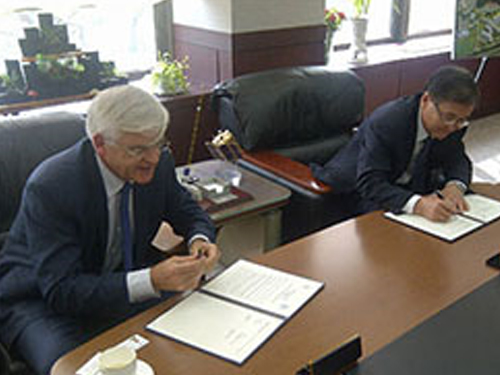 Partnership with École Centrale Paris
Courtesy of École Centrale Paris News: http://www.ecp.fr/lang/en/home/news?actuID=48892
Strengthening of the partnership betwenn CentraleSupélec and KAIST University, South Korea
The two institutions signed a new agreement.
Hervé Biausser (left in the picture), Director of CentraleSupélec, has met Sung-Mo Steve Kang (right in the picture), the President of the Korea Advanced Institute of Science and Technology (KAIST). They signed an agreement aiming to strengthen the partnership between the two institutions concerning research and higher education.
CentraleSupélec and KAIST have cooperated since 2010 on research projects in the context of the Erasmus Mundus BEAM and EASED programs, which are coordinated by CentraleSupélec.
The next step is now the application of graduate academic mobility in the common fields of excellency of the institutions: energy, electronic, physics and mathematics.
2015.11.02 View 6588
Partnership with École Centrale Paris
Courtesy of École Centrale Paris News: http://www.ecp.fr/lang/en/home/news?actuID=48892
Strengthening of the partnership betwenn CentraleSupélec and KAIST University, South Korea
The two institutions signed a new agreement.
Hervé Biausser (left in the picture), Director of CentraleSupélec, has met Sung-Mo Steve Kang (right in the picture), the President of the Korea Advanced Institute of Science and Technology (KAIST). They signed an agreement aiming to strengthen the partnership between the two institutions concerning research and higher education.
CentraleSupélec and KAIST have cooperated since 2010 on research projects in the context of the Erasmus Mundus BEAM and EASED programs, which are coordinated by CentraleSupélec.
The next step is now the application of graduate academic mobility in the common fields of excellency of the institutions: energy, electronic, physics and mathematics.
2015.11.02 View 6588 -
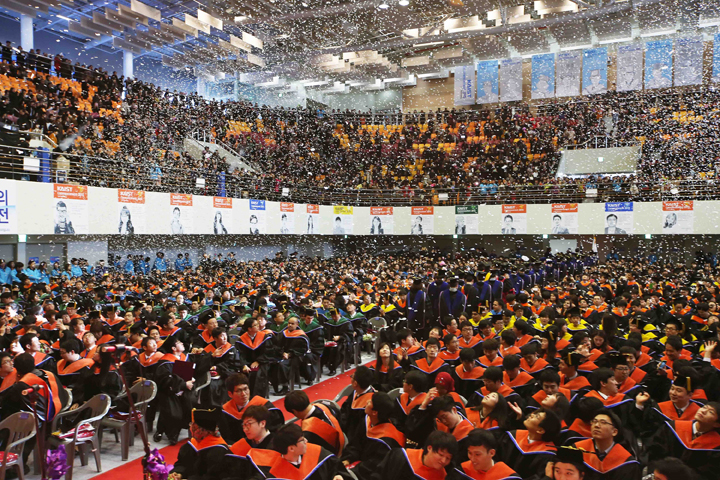 The 2015 KAIST Commencement
A total of 2,678 students (522 for Doctor's, 1,241 for Master’s, and 915 for Bachelor's) graduated.
Twin brothers received their Ph.D. degrees together.
KAIST held its commencement ceremony on February 13, 2015. Approximately 8,000 people including the graduating class, their families, faculty, staff, and friends attended the ceremony and celebrated this milestone.
President Steve Kang of KAIST congratulated the graduating students and stressed the importance of their “contribution to social growth with a compassionate heart and expertise” in his commencement address. He also mentioned that all graduates would be recognized as a “Very Important Person (VIP)” and laid out the essential characteristics of what constitutes a “true VIP”: vision, innovation, and perseverance.
Among the graduates were twin brothers, Dae-Ok Kim of the Energy, Environment, Water, and Sustainability (EEWS) Graduate School and Dae-Woo Kim of the Department of Chemical and Biomolecular Engineering, who received their doctorates on the same day.
The older brother, Dr. Dae-Ok Kim received both his Bachelor of Science (B.S.) and Master’s degrees from KAIST’s Department of Chemical and Biomolecular Engineering and later was admitted to the EEWS Graduate School for his doctorate. His dissertation was an “Investigation on the behaviors of gas molecules in water-filled nanopores: Applications to energy and environmental technology.” Professor Huen Lee of Chemical and Biomolecular Engineering was his faculty adviser.
Dr. Dae-Ok Kim said, “It was a great advantage to conduct cooperative research with my brother by sharing information and discussing each other’s fields.” After graduating, Dr. Kim plans to research gas hydrates and porous materials at KAIST’s Energy and Environmental Systems Lab for a year and to continue his research on applications in the United States.
The younger brother, Dr. Dae-Woo Kim received his B.S. from KAIST’s Department of Chemical and Biomolecular Engineering and was admitted to the Master of Science-Ph.D. Integrated Degree Program in the same department. His doctoral thesis was on “Direct visualization of large-area domains of two dimensional materials by using optical birefringency.” His faculty adviser was Professor Hee Tae Jung of Chemical and Biomolecular Engineering.
Dr. Dae-Woo Kim said, “During my time at the graduate school, I could overcome my difficulties by talking frankly to my brother. Our relationship deepened as we reached our academic goals together at KAIST.”
Dr. Dae-Woo Kim, who published more than 25 papers in international journals such as Nature and Nanotechnology, received the Silver Prize in the Human Tech Paper Awards sponsored by Samsung Electronics Corp. in 2011. After graduating, Dr. Kim will research graphene and 2D material structure control at KAIST’s Organic Opto-Electronic Materials Lab for a year and take up further research on their applications in the United States.
KAIST Commencement 2015
In the picture below, the twins pose together at the 2015 commencement. At the left is Dae-Ok Kim (elder brother) and the right is Dae-Woo Kim.
2015.02.16 View 9463
The 2015 KAIST Commencement
A total of 2,678 students (522 for Doctor's, 1,241 for Master’s, and 915 for Bachelor's) graduated.
Twin brothers received their Ph.D. degrees together.
KAIST held its commencement ceremony on February 13, 2015. Approximately 8,000 people including the graduating class, their families, faculty, staff, and friends attended the ceremony and celebrated this milestone.
President Steve Kang of KAIST congratulated the graduating students and stressed the importance of their “contribution to social growth with a compassionate heart and expertise” in his commencement address. He also mentioned that all graduates would be recognized as a “Very Important Person (VIP)” and laid out the essential characteristics of what constitutes a “true VIP”: vision, innovation, and perseverance.
Among the graduates were twin brothers, Dae-Ok Kim of the Energy, Environment, Water, and Sustainability (EEWS) Graduate School and Dae-Woo Kim of the Department of Chemical and Biomolecular Engineering, who received their doctorates on the same day.
The older brother, Dr. Dae-Ok Kim received both his Bachelor of Science (B.S.) and Master’s degrees from KAIST’s Department of Chemical and Biomolecular Engineering and later was admitted to the EEWS Graduate School for his doctorate. His dissertation was an “Investigation on the behaviors of gas molecules in water-filled nanopores: Applications to energy and environmental technology.” Professor Huen Lee of Chemical and Biomolecular Engineering was his faculty adviser.
Dr. Dae-Ok Kim said, “It was a great advantage to conduct cooperative research with my brother by sharing information and discussing each other’s fields.” After graduating, Dr. Kim plans to research gas hydrates and porous materials at KAIST’s Energy and Environmental Systems Lab for a year and to continue his research on applications in the United States.
The younger brother, Dr. Dae-Woo Kim received his B.S. from KAIST’s Department of Chemical and Biomolecular Engineering and was admitted to the Master of Science-Ph.D. Integrated Degree Program in the same department. His doctoral thesis was on “Direct visualization of large-area domains of two dimensional materials by using optical birefringency.” His faculty adviser was Professor Hee Tae Jung of Chemical and Biomolecular Engineering.
Dr. Dae-Woo Kim said, “During my time at the graduate school, I could overcome my difficulties by talking frankly to my brother. Our relationship deepened as we reached our academic goals together at KAIST.”
Dr. Dae-Woo Kim, who published more than 25 papers in international journals such as Nature and Nanotechnology, received the Silver Prize in the Human Tech Paper Awards sponsored by Samsung Electronics Corp. in 2011. After graduating, Dr. Kim will research graphene and 2D material structure control at KAIST’s Organic Opto-Electronic Materials Lab for a year and take up further research on their applications in the United States.
KAIST Commencement 2015
In the picture below, the twins pose together at the 2015 commencement. At the left is Dae-Ok Kim (elder brother) and the right is Dae-Woo Kim.
2015.02.16 View 9463 -
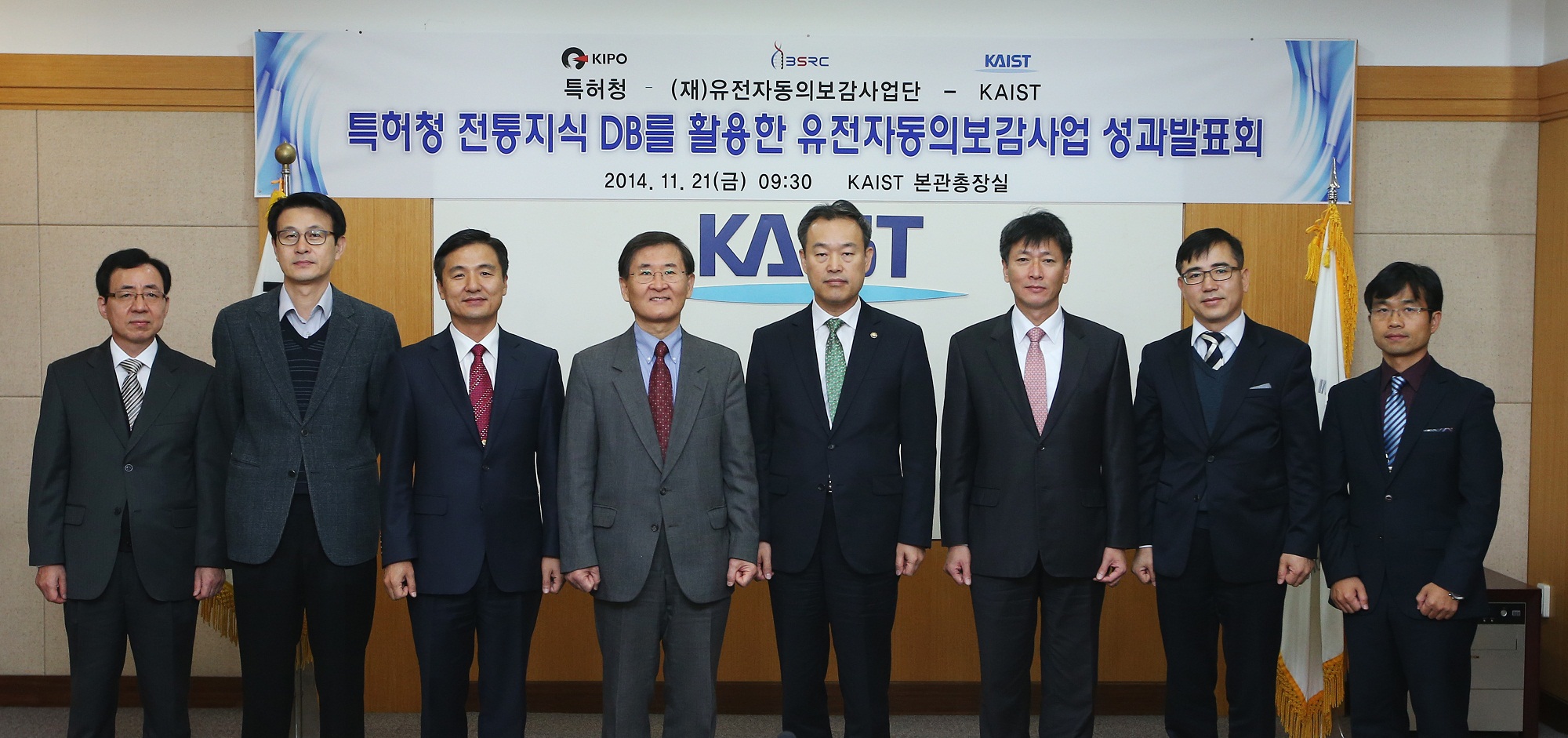 The Bio-Synergy Research Center, KAIST, Hosts an Annual Meeting
The Ministry of Science, ICT and Future Planning of the Republic of Korea founded the Bio-Synergy Research Center (BSRC) at KAIST in 2013 to develop source technology and generate new knowledge by conducting convergence research projects in natural resources with information technology (IT) and biotechnology.
The BSRC hosted an annual meeting on November 21, 2014, at the KAIST campus and reviewed the progress it made this year with the participation of President Steve Kang of KAIST, Commissioner Young-min Kim of KIPO, and Director Doheon Lee of BSRC.
The Korean Intellectual Property Office (KIPO) provided BSRC with its database in Korean traditional medicine that includes a vast amount of information about disease symptoms, native medicinal herbs and plant extracts, prescriptions, and chemical compounds used for medication. The database, “Compound Combination-Oriented Natural Product Database with Unified Terminology (COCUNUT),” holds approximately one million data sets in four major categories: prescriptions, medicinal resources, medicine components and functions, and diseases.
Based on COCUNUT, BSRC has been working on the standardization of Korean traditional medicine such as the development of data mapping and text mining technology and the analysis of big data in accordance with the said categories. Using IT and biotechnology, the center has also created a virtual human body to explain how traditional medicine works in human body, thereby contributing to the development of new natural materials for medicine.
2014.12.03 View 8706
The Bio-Synergy Research Center, KAIST, Hosts an Annual Meeting
The Ministry of Science, ICT and Future Planning of the Republic of Korea founded the Bio-Synergy Research Center (BSRC) at KAIST in 2013 to develop source technology and generate new knowledge by conducting convergence research projects in natural resources with information technology (IT) and biotechnology.
The BSRC hosted an annual meeting on November 21, 2014, at the KAIST campus and reviewed the progress it made this year with the participation of President Steve Kang of KAIST, Commissioner Young-min Kim of KIPO, and Director Doheon Lee of BSRC.
The Korean Intellectual Property Office (KIPO) provided BSRC with its database in Korean traditional medicine that includes a vast amount of information about disease symptoms, native medicinal herbs and plant extracts, prescriptions, and chemical compounds used for medication. The database, “Compound Combination-Oriented Natural Product Database with Unified Terminology (COCUNUT),” holds approximately one million data sets in four major categories: prescriptions, medicinal resources, medicine components and functions, and diseases.
Based on COCUNUT, BSRC has been working on the standardization of Korean traditional medicine such as the development of data mapping and text mining technology and the analysis of big data in accordance with the said categories. Using IT and biotechnology, the center has also created a virtual human body to explain how traditional medicine works in human body, thereby contributing to the development of new natural materials for medicine.
2014.12.03 View 8706 -
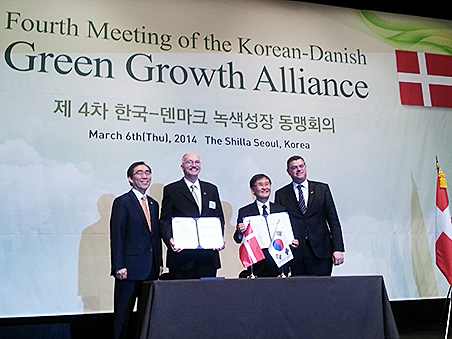 The 4th Meeting of Korea and Denmark Alliance for Green Growth
President Steve Kang attended the “Fourth Meeting of Korea and Denmark Alliance for Green Growth” which took place on March 6, 2014 at the Shilla Hotel in Seoul. President Kang was a keynote speaker at the meeting and gave a lecture on sustainable energy.
KAIST and the Technical University of Denmark (DTU) signed a memorandum of understanding (MOU) on the “Cooperation for Innovation and Entrepreneurship” at the meeting.
In the MOU, KAIST and DTU agreed to post the information on their websites regarding the patents acquired through the implementation of joint research programs. In addition, KAIST students will attend conferences and idea competitions organized by DTU, e.g., the Green Challenges. DTU students will participate in KAIST’s conferences and competitions including “Startup KAIST Global Idea Competition.”
2014.03.07 View 9190
The 4th Meeting of Korea and Denmark Alliance for Green Growth
President Steve Kang attended the “Fourth Meeting of Korea and Denmark Alliance for Green Growth” which took place on March 6, 2014 at the Shilla Hotel in Seoul. President Kang was a keynote speaker at the meeting and gave a lecture on sustainable energy.
KAIST and the Technical University of Denmark (DTU) signed a memorandum of understanding (MOU) on the “Cooperation for Innovation and Entrepreneurship” at the meeting.
In the MOU, KAIST and DTU agreed to post the information on their websites regarding the patents acquired through the implementation of joint research programs. In addition, KAIST students will attend conferences and idea competitions organized by DTU, e.g., the Green Challenges. DTU students will participate in KAIST’s conferences and competitions including “Startup KAIST Global Idea Competition.”
2014.03.07 View 9190 -
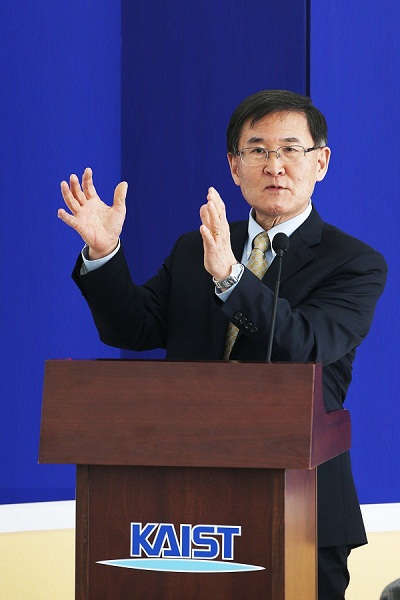 KAIST President Held One-year Anniversary Press Conference
President Steve Kang had a press conference
on February 25, 2014 at the Faculty Club on campus, commemorating the first
year of his presidency. About 30 different media representatives nationwide
attended the meeting.
At his first press conference on the anniversary of his tenure, President Kang
described what he has achieved in the past year, which were: 1) rebuilding the
campus culture to start a campaign for mutual respect, trust, and open
communication by holding meetings with the members of the KAIST community more
than 60 times, 2) establishing core values, creativity and challenge, to
enhance the fabric of the community, 3) restructuring of the university
administration, and 4) the announcement of the mid- and long-term development
plan.
He also mentioned that “2014 will be another exciting year for KAIST to make
more progress” and laid out a few major projects to be implemented this year:
launching of the “Committee for Engineering Education Innovation,” “Startup
KAIST” (an entrepreneurship program), “Greater Collaboration in Technology
Translation and Management with Seoul National University,” and “KAIST End Run”
(a global business incubation program).Explanation of 2014 Major Endeavors by President KangFor
the past decade, domestic engineering schools weighed SCI dissertation
publication more heavily in university evaluations, yielding a world-class
research level. However, such an approach resulted in placing less importance
on entrepreneurship, commercialization, or creating economic values.As a
result, engineering Professors have been evaluated as being too focused on theoretical
SCI dissertation research rather than practical research that could yield
economic benefits through commercialization of developed technology. In
addition, some have criticized that engineering universities have not educated
creative researchers demanded by the industry.KAIST
has begun responding to these criticisms and has made a few suggestions to strengthen
engineering education, promote entrepreneurship in engineers, and globalize Korean
venture companies.As
part of such efforts, KAIST established the KAIST Education and Research
Innovation Committee, composed of various individuals from the industry,
research institutes, alumni, faculty members, and others, to discuss ways to reinforce
engineering education.
A
course to encourage entrepreneurship will be implemented.Startup
KAIST will develop and commercialize innovative ideas from members of KAIST, and
the End Run project will enable students and faculty to establish a global,
venture company. KAIST hopes that a new entrepreneurial culture will be created
on campus, thereby the research success of KAIST members will lead to commercialization
and startups.KAIST
plans on releasing free internet lectures as part of its knowledge contribution
and sponsoring programs which will level the playing field in eduation.KAIST
will establish the KAIST Open Online Course (KOOC). An entrepreneurship
curriculum will be developed for KOOC. KAIST will start trials for KOOC from
2015, gradually expanding to include more courses.
2014.02.27 View 10474
KAIST President Held One-year Anniversary Press Conference
President Steve Kang had a press conference
on February 25, 2014 at the Faculty Club on campus, commemorating the first
year of his presidency. About 30 different media representatives nationwide
attended the meeting.
At his first press conference on the anniversary of his tenure, President Kang
described what he has achieved in the past year, which were: 1) rebuilding the
campus culture to start a campaign for mutual respect, trust, and open
communication by holding meetings with the members of the KAIST community more
than 60 times, 2) establishing core values, creativity and challenge, to
enhance the fabric of the community, 3) restructuring of the university
administration, and 4) the announcement of the mid- and long-term development
plan.
He also mentioned that “2014 will be another exciting year for KAIST to make
more progress” and laid out a few major projects to be implemented this year:
launching of the “Committee for Engineering Education Innovation,” “Startup
KAIST” (an entrepreneurship program), “Greater Collaboration in Technology
Translation and Management with Seoul National University,” and “KAIST End Run”
(a global business incubation program).Explanation of 2014 Major Endeavors by President KangFor
the past decade, domestic engineering schools weighed SCI dissertation
publication more heavily in university evaluations, yielding a world-class
research level. However, such an approach resulted in placing less importance
on entrepreneurship, commercialization, or creating economic values.As a
result, engineering Professors have been evaluated as being too focused on theoretical
SCI dissertation research rather than practical research that could yield
economic benefits through commercialization of developed technology. In
addition, some have criticized that engineering universities have not educated
creative researchers demanded by the industry.KAIST
has begun responding to these criticisms and has made a few suggestions to strengthen
engineering education, promote entrepreneurship in engineers, and globalize Korean
venture companies.As
part of such efforts, KAIST established the KAIST Education and Research
Innovation Committee, composed of various individuals from the industry,
research institutes, alumni, faculty members, and others, to discuss ways to reinforce
engineering education.
A
course to encourage entrepreneurship will be implemented.Startup
KAIST will develop and commercialize innovative ideas from members of KAIST, and
the End Run project will enable students and faculty to establish a global,
venture company. KAIST hopes that a new entrepreneurial culture will be created
on campus, thereby the research success of KAIST members will lead to commercialization
and startups.KAIST
plans on releasing free internet lectures as part of its knowledge contribution
and sponsoring programs which will level the playing field in eduation.KAIST
will establish the KAIST Open Online Course (KOOC). An entrepreneurship
curriculum will be developed for KOOC. KAIST will start trials for KOOC from
2015, gradually expanding to include more courses.
2014.02.27 View 10474 -
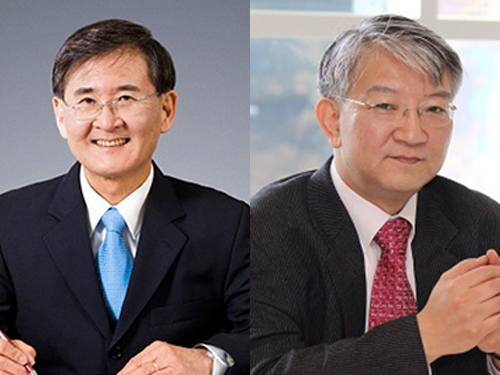 KAIST Participates in the 2014 Davos Forum on January 22-25 in Switzerland
Through the sessions of the Global University Leaders Forum, IdeasLab, and Global Agenda Councils on Biotechnology, KAIST participants will actively engage with global leaders in the discussion of issues on education innovation and technological breakthroughs.
The 2014 Annual Meeting of the World Economic Forum (WEF), known as the Davos Forum, will kick off on January 22-25 in Davos-Klosters, Switzerland, under the theme of "The Reshaping of the World: Consequences for Society, Politics, and Business." Each year, the Forum attracts about 2,500 distinguished leaders from all around the world and provides an open platform to identify the current and emerging challenges facing the global community and to develop ideas and actions necessary to respond to such challenges.
President Sung-Mo Steve Kang and Distinguished Professor Sang Yup Lee from the Department of Chemical and Biomolecular Engineering, KAIST, will attend the Forum and engage in a series of dialogues on such issues as Massive Open Online Courses, new paradigms for universities and researchers, the transformation of higher education, the role and value of scientific discoveries, and the impact of biotechnology on the future of society and business.
At the session entitled "New Paradigms for Universities of the Future" hosted by the Global University Leaders Forum (GULF), President Kang will introduce KAIST"s ongoing online education program, Education 3.0. GULF was created in 2006 by WEF, which is a small community of the presidents and senior representatives of the top universities in the world.
Implemented in 2012, Education 3.0 incorporates advanced information and communications technology (ICT) to offer students and teachers a learner-based, team-oriented learning and teaching environment. Under Education 3.0, students study online and meet in groups with a professor for in-depth discussions, collaboration, and problem-solving. KAIST plans to expand the program to embrace the global community in earnest by establishing Education 3.0 Global in order to have interactive real-time classes for students and researchers across regions and cultures.
President Kang will also present a paper entitled "Toward Socially Responsible Technology: KAIST"s Approach to Integrating Social and Behavioral Perspectives into Technology Development" at another session of GULF called "Seeking New Approaches to Critical Global Challenges." In the paper, President Kang points out that notwithstanding the many benefits we enjoy from the increasingly interconnected world, digital media may pose a threat to become a new outlet for social problems, for example, Internet or digital addiction.
Experts say that early exposure to digital devices harms the healthy development of cognitive functions, emotions, and social behavior. President Kang will introduce KAIST"s recent endeavor to develop a non-intrusive technology to help prevent digital addiction, which will ultimately be embedded in the form of a virtual coach or mentor that helps and guides people under risk to make constructive use of digital devices. President Kang stresses the fundamental shift in the science and technology development paradigm from research and development (R&D) to a research and solution development (R&SD), taking serious consideration of societal needs, quality of life, and social impacts when conducting research.
Professor Sang Yup Lee will moderate the IdeasLab session at the Davos Forum entitled "From Lab to Life with the California Institute of Technology (Caltech)." Together with scientists from Caltech, he will discuss scientific breakthroughs that transform institutions, industries, and individuals in the near future, such as the development of damage-tolerant lightweight materials with nanotechnology, the ability to read and write genomes, and wireless lab-in-the-body monitors. In addition, he will meet global business leaders at the session of "Sustainability, Innovation, and Growth" and speak about how emerging technologies, biotechnology in particular, will transform future societies, business, and industries.
As a current special adviser of the World Economic Forum"s (WEF) Chemicals Industry Community, Professor Lee will meet global chairs and chief executive officers of chemical companies and discuss ways to advance the industry to become more bio-based and environmentally friendly. He served as a founding chairman of WEF"s Global Agenda Councils on Biotechnology in 2013.
President Sung-Mo Steve Kang Distinguished Professor Sang Yup Lee
2014.01.17 View 12280
KAIST Participates in the 2014 Davos Forum on January 22-25 in Switzerland
Through the sessions of the Global University Leaders Forum, IdeasLab, and Global Agenda Councils on Biotechnology, KAIST participants will actively engage with global leaders in the discussion of issues on education innovation and technological breakthroughs.
The 2014 Annual Meeting of the World Economic Forum (WEF), known as the Davos Forum, will kick off on January 22-25 in Davos-Klosters, Switzerland, under the theme of "The Reshaping of the World: Consequences for Society, Politics, and Business." Each year, the Forum attracts about 2,500 distinguished leaders from all around the world and provides an open platform to identify the current and emerging challenges facing the global community and to develop ideas and actions necessary to respond to such challenges.
President Sung-Mo Steve Kang and Distinguished Professor Sang Yup Lee from the Department of Chemical and Biomolecular Engineering, KAIST, will attend the Forum and engage in a series of dialogues on such issues as Massive Open Online Courses, new paradigms for universities and researchers, the transformation of higher education, the role and value of scientific discoveries, and the impact of biotechnology on the future of society and business.
At the session entitled "New Paradigms for Universities of the Future" hosted by the Global University Leaders Forum (GULF), President Kang will introduce KAIST"s ongoing online education program, Education 3.0. GULF was created in 2006 by WEF, which is a small community of the presidents and senior representatives of the top universities in the world.
Implemented in 2012, Education 3.0 incorporates advanced information and communications technology (ICT) to offer students and teachers a learner-based, team-oriented learning and teaching environment. Under Education 3.0, students study online and meet in groups with a professor for in-depth discussions, collaboration, and problem-solving. KAIST plans to expand the program to embrace the global community in earnest by establishing Education 3.0 Global in order to have interactive real-time classes for students and researchers across regions and cultures.
President Kang will also present a paper entitled "Toward Socially Responsible Technology: KAIST"s Approach to Integrating Social and Behavioral Perspectives into Technology Development" at another session of GULF called "Seeking New Approaches to Critical Global Challenges." In the paper, President Kang points out that notwithstanding the many benefits we enjoy from the increasingly interconnected world, digital media may pose a threat to become a new outlet for social problems, for example, Internet or digital addiction.
Experts say that early exposure to digital devices harms the healthy development of cognitive functions, emotions, and social behavior. President Kang will introduce KAIST"s recent endeavor to develop a non-intrusive technology to help prevent digital addiction, which will ultimately be embedded in the form of a virtual coach or mentor that helps and guides people under risk to make constructive use of digital devices. President Kang stresses the fundamental shift in the science and technology development paradigm from research and development (R&D) to a research and solution development (R&SD), taking serious consideration of societal needs, quality of life, and social impacts when conducting research.
Professor Sang Yup Lee will moderate the IdeasLab session at the Davos Forum entitled "From Lab to Life with the California Institute of Technology (Caltech)." Together with scientists from Caltech, he will discuss scientific breakthroughs that transform institutions, industries, and individuals in the near future, such as the development of damage-tolerant lightweight materials with nanotechnology, the ability to read and write genomes, and wireless lab-in-the-body monitors. In addition, he will meet global business leaders at the session of "Sustainability, Innovation, and Growth" and speak about how emerging technologies, biotechnology in particular, will transform future societies, business, and industries.
As a current special adviser of the World Economic Forum"s (WEF) Chemicals Industry Community, Professor Lee will meet global chairs and chief executive officers of chemical companies and discuss ways to advance the industry to become more bio-based and environmentally friendly. He served as a founding chairman of WEF"s Global Agenda Councils on Biotechnology in 2013.
President Sung-Mo Steve Kang Distinguished Professor Sang Yup Lee
2014.01.17 View 12280 -
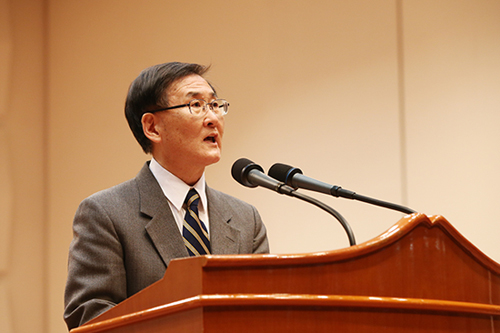 New Year's Greeting Ceremony Held on January 2nd
The year 2014 is the Year of the Wooden Horse in Chinese astrology: A dynamic (Horse) and prosperous (Wood) New Year to all at KAIST!
President Steve Kang hosted a New Year’s greeting ceremony on January 2 nd at an auditorium on campus and gave a keynote speech on major administrative policies and academic programs to take effect for the year 2014. K-Valley and End-Run projects, as well as a review of efforts to decentralize the academic system in order to grant colleges and departments more autonomy in their operation of education and research programs were among the few discussed.
The K-Valley project will help KAIST and its neighboring research complex, the Daedeok Innopolis, build a leading multi-layered, innovative cluster of startups and new businesses in Korea through close collaborations among university, research institutes, and industry. The End-Run is a project to attract global investors and companies to Korea that will capitalize on the highest quality talents and technologies developed by KAIST.
President Steve Kang said that he would continue the last year’s campaign to make the campus “happier” throughout this year, encouraging members of the KAIST community to trust and respect and communicate better with each other.
2014.01.07 View 7644
New Year's Greeting Ceremony Held on January 2nd
The year 2014 is the Year of the Wooden Horse in Chinese astrology: A dynamic (Horse) and prosperous (Wood) New Year to all at KAIST!
President Steve Kang hosted a New Year’s greeting ceremony on January 2 nd at an auditorium on campus and gave a keynote speech on major administrative policies and academic programs to take effect for the year 2014. K-Valley and End-Run projects, as well as a review of efforts to decentralize the academic system in order to grant colleges and departments more autonomy in their operation of education and research programs were among the few discussed.
The K-Valley project will help KAIST and its neighboring research complex, the Daedeok Innopolis, build a leading multi-layered, innovative cluster of startups and new businesses in Korea through close collaborations among university, research institutes, and industry. The End-Run is a project to attract global investors and companies to Korea that will capitalize on the highest quality talents and technologies developed by KAIST.
President Steve Kang said that he would continue the last year’s campaign to make the campus “happier” throughout this year, encouraging members of the KAIST community to trust and respect and communicate better with each other.
2014.01.07 View 7644